#Pliny the Younger
Text
Latin Literature Tournament - Round 1
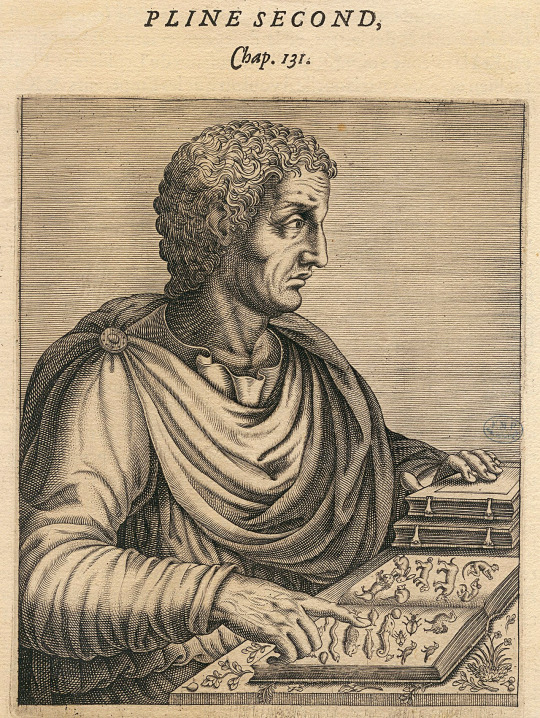
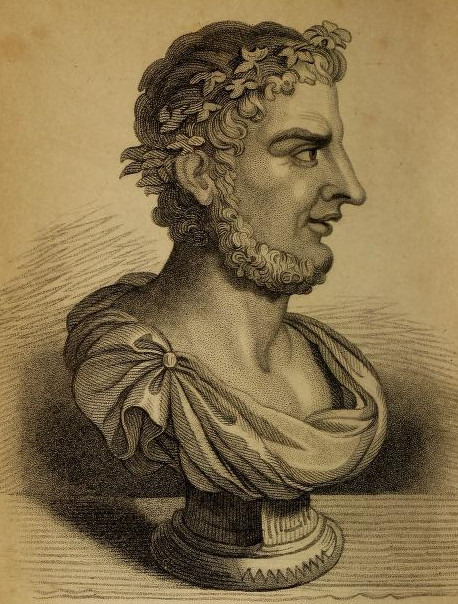
Propaganda under the cut!
Pliny Propaganda:
His description of Vesuvius is so fucking cool and important, you guys. It's so cool that "Plinian eruptions" are a thing in volcanology
He writes some neat descriptions of gardens and private horticulture, so he's an important source on Roman aesthetics of domestic design
His letters really are bangers. I love his friendship with Tacitus, and the ghost stories are so fucking fun
Juvenal Propaganda:
I love reading and fighting Juvenal. He is such an asshole and so full of shit (and his poems really are a blast)
That said the man sure can turn a phrase. Bread and circuses, anyone?
Is that a farrago in your libellus or are you just happy to see me
#tagamemnon#classics#pliny#pliny the younger#juvenal#latin#latin literature#latin literature tournament#tumblr polls#tournament polls#bracket#satire#letters#epistolography
45 notes
·
View notes
Text


Watch as a video instead: Greek Myth Comix tells an Ancient Ghost Story feat. Pliny The Younger
https://youtu.be/mLLo8Y5ZZyM
Teachers: get this as a poster or PDF for class: https://greekmythcomixshop.wordpress.com/2020/11/06/an-ancient-ghost-story-comic-pdf-or-poster/
#ghost story#ghost stories#halloween#happy halloweeeeeeen#spooky#classical civilisation#classics#pliny#Pliny the younger#Athenodorus#ancient ghost story#Roman history#Roman literature#tagamemnon#illustration#comic#comix#spooktober#roman history teaching#supernatural#line art#black and white#Roman ghost story#greek myth comix
101 notes
·
View notes
Text

Joseph Mallord William Turner, Vesuvius in Eruption, 1817-20
“The shuddering black cloud, broken up by twisting, trembling dispersions of fiery air, ruptured into long streaks of flame, both similar to and greater than lightning bolts.”
— Pliny the Younger, to Tacitus
(original translation)
#art#fine art#art history#romanticism#romantic art#painting#watercolor#joseph mallord william turner#jmw turner#19th century#vesuvius#pompeii#roman history#pliny the younger#tacitus#roman literature
49 notes
·
View notes
Photo

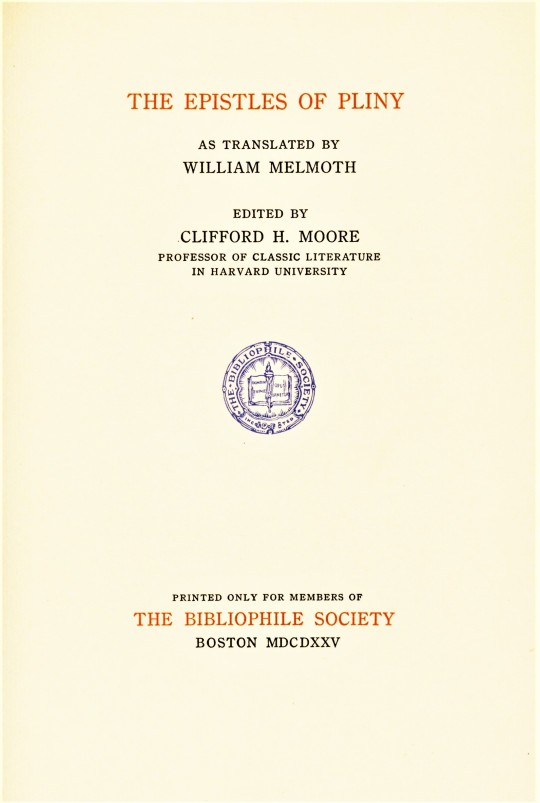
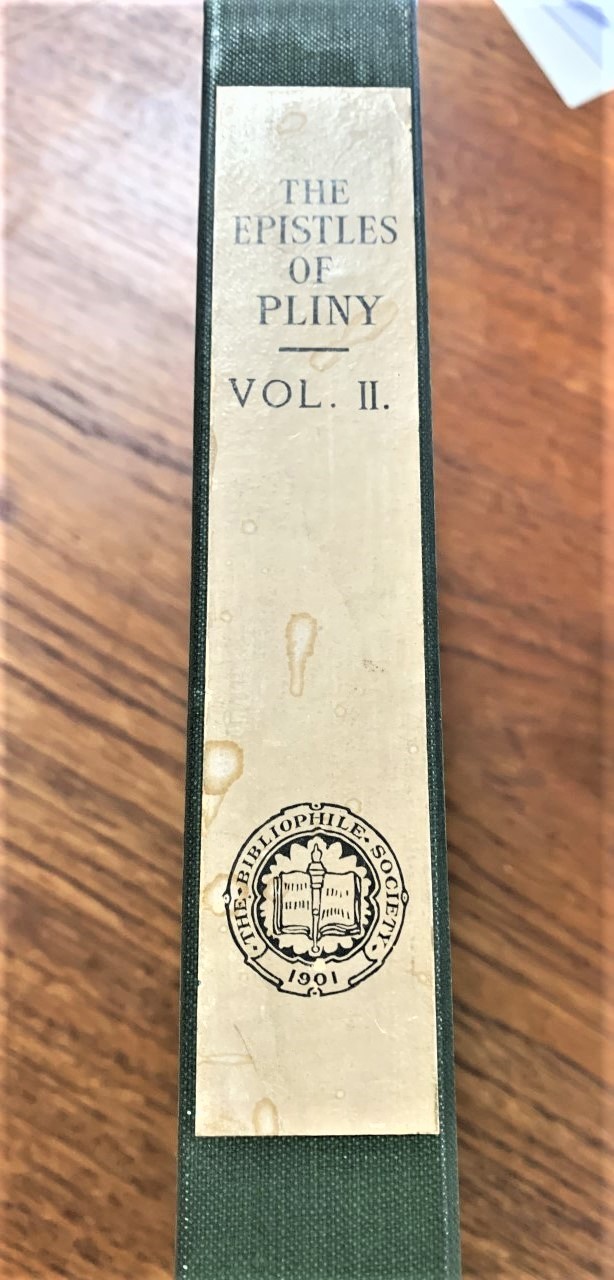

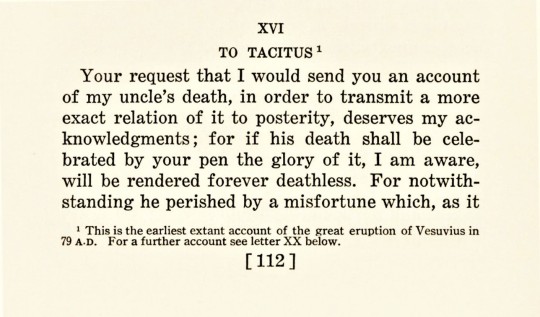
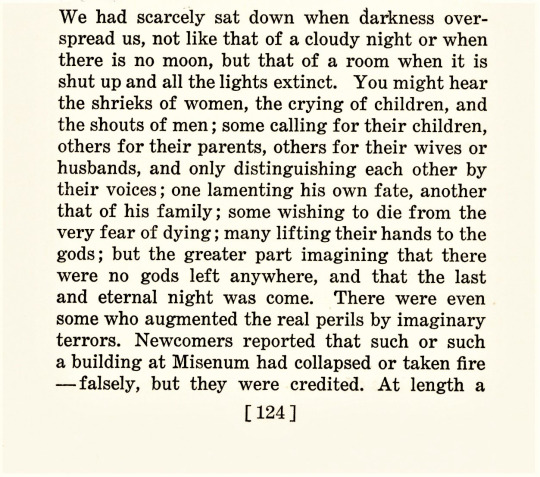
The Eruption of Mt. Vesuvius
The Eruption of Mt. Vesuvius in 79 CE remains one of the deadliest natural disasters in recorded history. Not only did the volcano destroy the economically powerful city of Pompeii, but Herculaneum, Oplontis, Stabiae were also buried and thus lost to the Roman Empire. The number of victims is unknown, but given the size of the four cities, estimates have reached over 18,000 individuals.
Today only one first-hand account of this horrific event survives in two letters from Pliny the Younger to the Roman historian Tacitus. They are preserved as letters 6.16 and 6.20 in the collected Epistles of Pliny. Among our holdings of the works of Pliny is this 3-volume set of the Epistles with William Melmoth’s 18th-century translation edited by Clifford Herschel Moore, and printed by the Harvard University Press in an edition of 405 copies for members of The Bibliophile Society, Boston, in 1925.
While the term ‘volcanic eruption’ evokes scenes of lava and fire, the reality is much more frightening. Curiously, there is no word for volcano in the Latin language. While ancient Romans were aware of the destructive power of volcanoes, there’s some debate about whether they were aware that Vesuvius was a volcano before its eruption. Signs of the eruption began back in 62CE with a great earthquake that caused much of the city to collapse. Smaller earthquakes continued over the next 15 years until one was accompanied by the rise of a column of smoke from Mt. Vesuvius in October 79 CE.
The hot gases that made up the column of smoke began to cool, darkening the sky, and not long after a rain of pumice began to fall, and after 15 hours ceilings began to collapse. Nevertheless, many residents chose to take shelter rather than flee. At 4am the first 500C pyroclastic surge barred down the volcano, burying Herculaneum. Six more of these surges occurred before the end of the eruption, destroying Pompeii, Oplontis, and Stabiae.
The 17-year old Pliny was in the port town of Misenum across the Bay of Naples from the volcano at the time. Pliny’s uncle, Pliny the Elder, commander of the Roman fleet at Misenum, launched a rescue mission and went himself to the rescue of a personal friend. The elder Pliny did not survive the attempt. In Pliny the Younger’s first letter to Tacitus, he relates what he could discover from witnesses of his uncle's experiences. In a second letter, he details his own observations after the departure of his uncle.
Mt. Vesuvius is still active and according to volcanologists, erupts about every 2000 years, which would be right about now. Who will be our next Pliny the Younger?
Our copy of The Epistles of Pliny is another gift from our friend and benefactor Jerry Buff.
View more of my Classics posts.
– LauraJean, Special Collections Undergraduate Classics Intern
#Classics#classical history#Roman History#Mt. Vesuvius#Eruption of Mt. Vesuvius#Pliny the Younger#Epistles of Pliny the Younger#Pliny the Elder#Tacitus#William Melmoth#Clifford Herschel Moore#Harvard University Press#The Bibliophile Society#volcanic eruptions#Pompeii#herculaneum#Oplontis#Stabiae#Jerry Buff#LauraJean
90 notes
·
View notes
Text
Rating all the Latin authors I've read in the past two years in honor of my oral Latin exam tomorrow
Caesar (De Bello Gallico)
This is a weird one because while his prose isn't extremely difficult, it was also the first unedited work I read, so for lil 15-year-old me, this was very difficult. But I learned a lot from Caesar (especially that he made it an art to making his sentences as long as possible. We read an entire 200 words, and IT WAS JUST ONE SENTENCE.), and the sense of nostalgia while rereading it is very pleasant, so I will give you a solid 6/10
Pliny the Younger (Epistulae)
Mixed feelings about this one again. This could also be just because I despise prose. I really do not like it at all. Pliny's epistulae were pretty okay. I liked them a little better than Caesar's because of their variety (for those that don't know, epistulae means letters). His letter about the Vesuvius was a lot of fun to translate, even with all the hyperbata, but his letters about or to his third wife were very uncomfortable. Like, I get things were different back then. BUT YOU WERE 45, PLINY. 45. SHE WAS WHAT? 14? 15 TOPS? MY GOD. THAT'S A BIGGER AGE DIFFERENCE THAN I HAVE WITH MY FATHER.
7/10
Ovid (Metamorphoses)
Ovid is life Ovid is love. He was the one who introduced me to Latin poetry, and I will always love him for it. He was an icon and a legend. The poems of his that we read (Daedalus & Icarus, Latona and the Lycian peasants, Diana and Actaeon) were all bangers, and I love them all to death. I never wanted to go back to reading prose after this (but unfortunately, I will have to next year. ew)
11/10 (I love you, Ovid)
Vergil (The Aeneid)
*deep sigh* Listen. I love his complex works, and I have great respect for this poem but by the GODS. Vergil's poetry is the most difficult I've had to translate by a long shot. He made me rethink my entire career in Latin. I have considered quitting so many times because of this man. I felt like a complete idiot most of the time. This is not a guy to fuck with. Luckily I got through it on my finals (barely.) but Christ alive this man made my life difficult.
5/10
Horatius (Satires and Odes)
Horatius will always have a special place in my heart. We read his poetry right after Vergil's, and it almost completely restored my faith in my abilities. He's just my little guy and I have fond memories of translating his works. We still know many Latin phrases that he wrote (Carpe Diem being the most famous. Hello, DPS fandom). Also, he and Vergil were most definitely in love. I don't make the rules. I have evidence if you want me to elaborate.
9/10
Catullus (love poems)
Ah, Catullus. Horny poet of the year. Had a wild affair with an older married woman. Nepotism baby. Sappho stan. Didn't know how to budget, but we aren't holding that against him. Just wanted to write poetry and dance (who doesn't, honestly). Gave fuck-all about education. Wrote nearly all of his poetry about the older woman he had an affair with. Might I add that this woman was married to one of his father's bestest buddies? Yeah. Icon. Here's a kid's choice award.
8/10
Martialis (Epigrams)
This dude had ZERO chill. Roasted everyone in the city. Literally, no one is safe. Wasn't afraid to call people out by their real names. Some people allegedly committed suicide after being roasted by this guy. Translating his epigrams gave me more joy than hearing we had seen the end of Vergil. His humour may be a little silly now, but I will not accept any Martialis slander on my blog.
10/10
And that is all folks
#latin student#latin memes#latin literature#publius ovidius naso#classics#ancient greek#martialis#how is that not a tag#this guy is the epitome of Tumblr humour#pliny the younger#pliny#julius caesar#roman history#roman literature#catullus#vergil#the aeneid#vergil and horatius were gay and in love pass it on#horatius
43 notes
·
View notes
Text

ZOROASTER, as many say, was the same as the son of Noah named Ham. He was the first king of the Bactrians, and the first inventor of the arts of magic, and the seven liberal arts, and the courses of the sky and the stars. There are those who will report that he laughed as he was born. This should not be taken as a good omen; common people wail while being born. And so he was conquered by Ninus, and Ninus was also struck by an arrow; he died of this wound, leaving behind his son and heir, who was named Ninias. Ninus built the city of Nineveh, which took three days to walk around, and which Cyrus, King of the Assyrians, destroyed. Augustine, City of God, book 21, chapter 4; Eusebius; Pliny, book 30, chapter 7.
#zoroaster#ham#prima pars#biblical figures#rulers#religious leaders#augustine#eusebius#pliny the younger
5 notes
·
View notes
Photo

“In the darkness you could hear the crying of women, the wailing of infants, and the shouting of men. Some prayed for help. Others wished for death. But still more imagined that there were no Gods left, and that the universe was plunged into eternal darkness.”
― Pliny the Younger, The Letters Of Pliny, The Younger on the Eruption of Mount Vesuvius in 79AD that destroyed the campanian towns of Pompeii and Herculaneum.
17 notes
·
View notes
Text
I really gotta hand it over the Pliny the Younger for the way I imagine the end of the world looking. 🤣 iykyk

#pompeii#philosophy#roman philosophy#history#historical depictions#Pompeii movie intro#pliny the younger#dark and moody#end of the world#devastation#mount vesuvius#dark academia
4 notes
·
View notes
Text
"An object in possession seldom retains the same charm that it had in pursuit."---Pliny the Younger [Gaius Plinius Caecilius Secundis], 61-c.113 AD
“An object in possession seldom retains the same charm that it had in pursuit.”—Pliny the Younger [Gaius Plinius Caecilius Secundis], 61-c.113 AD
View On WordPress
2 notes
·
View notes
Text

Russian River Brewing
5 notes
·
View notes
Text
Found the article (see here)! It wasn't a poem it was an analysis of a published love letter from Pliny the Younger to his wife:
Ep. 7.5To Calpurnia.You would scarcely credit how much I miss you and long to see you again. My love for you is the primary cause of this longing, and the fact that we have not been used to be away from each other is the second. Hence it is that I spend a great part of my nights awake and thinking of you, and regularly at the hours when I used to visit you I find my feet carrying me – in the literal sense of the term towards your room, and then, sick and sad at heart, and feeling as though I had been refused admittance, I turn to quit the empty threshold. At one time only am I free from these tormenting pangs, and that is when I am in court and busy pleading for my friends. Imagine, I pray you, how wretched is my life, when I find my rest in hard work, and my solace in being harassed and anxious. Farewell.
The anonymous author points out that Pliny is sort of imitating the convention of the paraklausithyron which was a pretty recurring ancient greek motif where a lover is locked outside of the door of his beloved and is lamenting that he can't get inside. The author correctly states that in this case it is probably being used in a tongue in cheek way because
Pliny is overcome by love until he actually needs to do his work.
Pliny "approaches the door of this house not as a lover begging admittance, but as a master. He owns the door."
Calpurnia has no right of refusal.
#not to say people didnt love each other in times when a seriously wild amount of oppression was occuring#but lets all be sensible and criticaly think about it fellas#pliny the younger#feel like sometimes ppl have taken the whole human beings were always human beings thing to be like oh ok so everything was always exactly#the same as now#like uhhh no
1 note
·
View note
Link
Chapters: 3/?
Fandom: Pocket Monsters | Pokemon - All Media Types, Pocket Monsters | Pokemon (Main Video Game Series), Pocket Monsters | Pokemon (Anime), Classical Greece and Rome History & Literature RPF
Rating: General Audiences
Warnings: No Archive Warnings Apply
Characters: Fokko | Fennekin, Mokuroh | Rowlet, Pochama | Piplup, Pliny the Younger (61–c. 113 CE), Publius Cornelius Tacitus, Marcus Ulpius Traianus | Emperor Trajan, Eievui | Eevee, Kudari | Emmet, Dentula | Galvantula
Additional Tags: Alternate Universe - Historical, Alternate Universe - Ancient Rome, Fan Game
Summary:
The year is 100 CE, you have just been chosen by Consul Pliny to help finish his deceased uncle’s study to document the various creatures throughout the Empire known as “Pokemon”, who fill various roles alongside humans. Though on your way you discover suspicious behavior and danger around every corner, including a shady governor named Marius Priscus.
0 notes
Text
sometimes i feel like i’m wasting my life and missing out on everything. then i learn that pliny the younger ignored the eruption of mount vesuvius because he had writing homework, even after his uncle explicitly invited him to come along and check out pompeii.
1 note
·
View note
Text

NAHOR, son of Serug, when he was 29 years old begat Terah, in the 1879th year of the world and the 2083rd year before the birth of Christ. He lived 119 years afterwards, begetting sons and daughters. In total he lived 148 years, and he died. Genesis 11. Around this time the kingdom of the Sicyonians began, whose first king was Aegialeus, for whom Aegialia is named, today called the Peloponnese. Consult Pliny, book 4, ch. 5
2 notes
·
View notes
Text

Pliny the Younger. At The Pub in Ukiah California. Very good but not superlative. It’s like sex - if I close my eyes it feels 10x better.
1 note
·
View note
